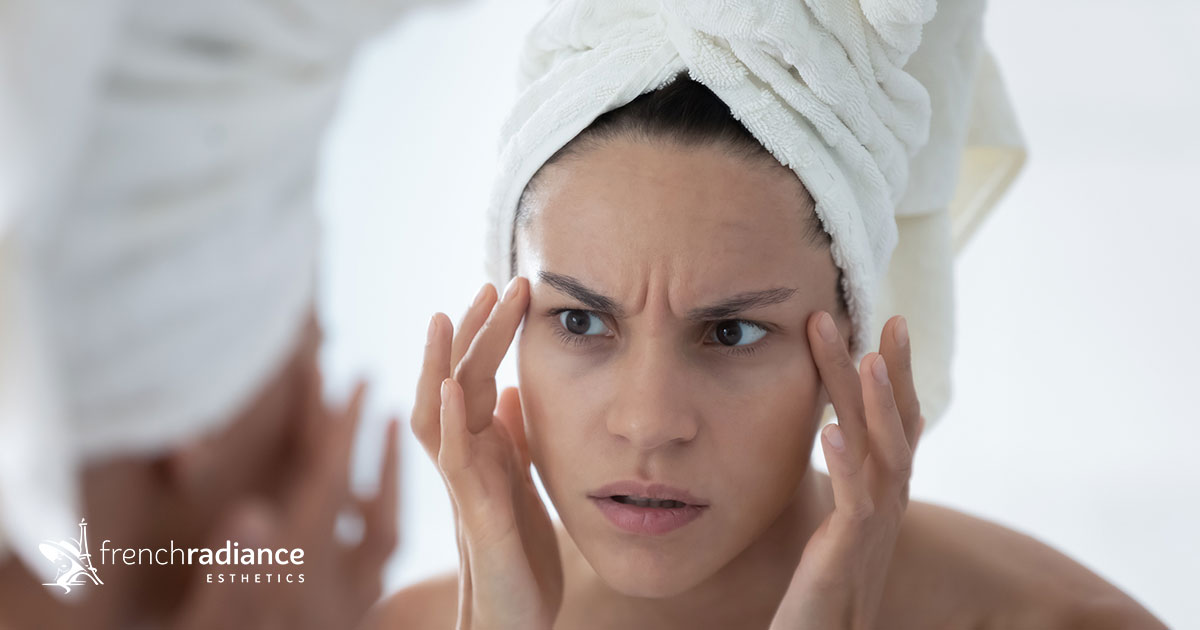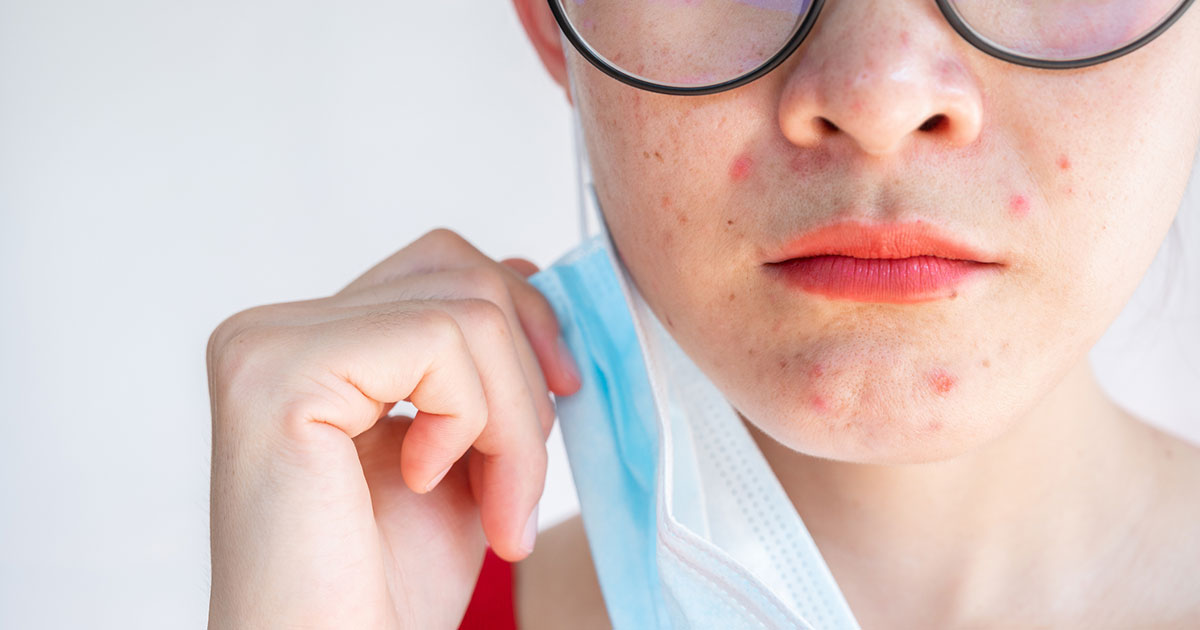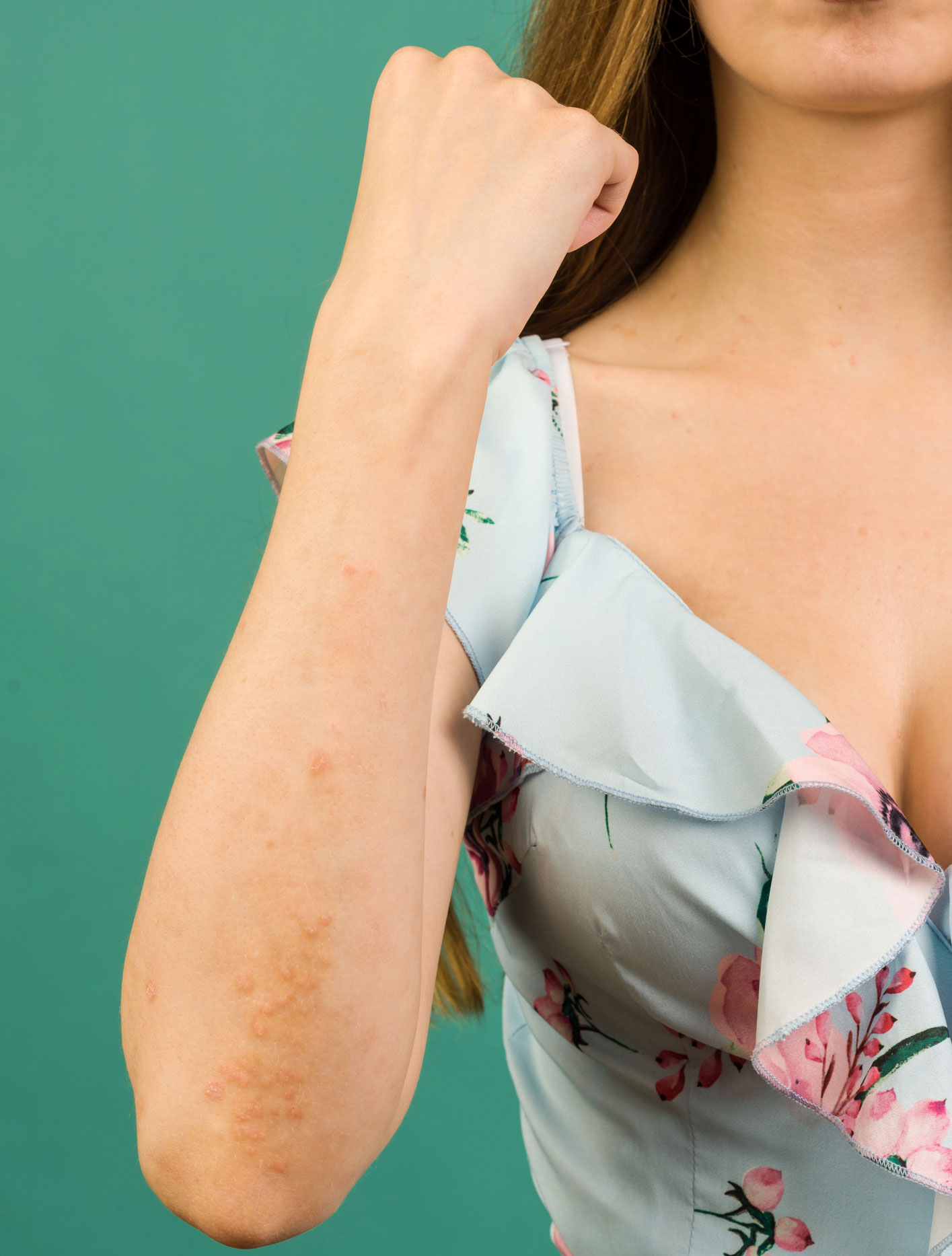
We all want our skin to look its best throughout all life’s stages. However, did you know stress can affect the appearance of your skin? Yes, it’s science!
Below, we’ll be talking about the effects of stress on skin, what to do during times of stress, and how to reduce the negative impact stress has on your skin!
Can Stress and Anxiety Affect Your Skin?
Skin is the largest organ in the human body. It serves as a protective barrier, helps with temperature regulation, provides immunity, movement and growth, helps with excretion, and serves as a water resistant layer. 1
Just like your other organs, it’s important to take care of your skin. Although we don’t always cause it ourselves, stress and anxiety can have a negative effect on the appearance and function of the skin. In fact, stress is known to affect all components of the skin, from its appearance and texture, to its elasticity and more.
Stress can affect the appearance of your skin by causing a chemical reaction that can make your skin more sensitive and reactive. 2 This most often appears as redness, acne, and other breakouts, which are caused as extra oil is produced to make up for the dryness often caused by stress. Stress and anxiety can also increase inflammation, worsen pre-existing skin conditions, lead to product reactions, and cause the skin to become red or itchy, develop bumps, and experience a slew of other issues.
Does Stress Cause Dull Skin?
Does depression affect skin tone? What about stress? Although there is not a direct link to stress or depression changing the color of your skin, they do have an indirect link. Stress can cause a person to overly itch or rub their skin. If this continues for a long period of time, a person’s skin can begin to dull or darken. Unfortunately, sometimes, these changes to a person’s skin color can alter the pigmentation permanently.
In some instances, during a stressful time, a person’s normal skin care routine can even cause issues. When a person is stressed, different types of hormones and different amounts of hormones are released in the body. These hormones can interact with the skin and can lead to irritation, even with the use of familiar products. If this is happening to you, it’s important to talk with a skin professional about things you can do until your hormones and skin return to normal.
Why Does My Skin Flare-Up When I’m Stressed?
Stressful situations can trigger a shift in hormones throughout the human body, which can negatively affect the skin. Heightened stress leads to changes of the serum level of many hormones. Some of these include growth hormone, glucocorticoids, prolactin, and catecholamines. 3
Growth hormone, also known as human growth hormone, is responsible for stimulating growth, cell regeneration, and cell reproduction. Glucocorticoids have a wide variety of responsibilities, but they are most known for providing anti-inflammatories for the skin. Prolactin’s main function in reference to the skin is to regulate hair growth. Catecholamines are produced in response to stress, and although they are an important factor, too much caused by prolonged stress can lead to diseases.
Hormones in general also change throughout a person’s life such as through puberty, pregnancy menopause, and during a women’s menstrual cycle. Other lifestyle changes that cause stress will alter a person’s hormones and, in return, cause skin changes. These changes may come in the form of acne, aging spots, dryness, oiliness, and other issues.
Having a good skin care regimen can help with all forms of skin issues, and stress may alter the issues you are suffering from. Be sure to talk to a skincare professional to figure out which one is the best for you based on your particular skin type.
Stress Can Increase Skin Inflammation
Your mind, body, and gut are all closely associated and interact intimately with one other. For this reason, when the brain perceives stress, it can eventually lead to inflammation throughout your body.
One response to stress is a slowing down of digestion. This can affect the balance of beneficial bacteria in your gut, and if the stress persists, it can cause inflammation of your digestive system — which can also affect the rest of your body.
Other chronic diseases that stress can cause include atherosclerosis, depression, and non-alcoholic fatty liver disease. These diseases, along with other chronic diseases, have a direct link to chronic inflammation. So, can depression cause skin problems? Absolutely! Inflammation throughout the body can lead to skin inflammation and eventually skin infections. Some of these infections affect only a small part of the skin, while others can affect the entire body. Common signs include redness, pain, swelling, itchiness, and bumpiness.
It’s important to try to avoid things that will worsen the inflammation. Drinking water and following a healthy diet have been known to alleviate symptoms, but it’s best to talk to a professional about the symptoms you are experiencing so they can tell you exactly how to deal with them.
Stress Can Trigger or Worsen Other Skin Conditions
When you already have a skin condition, it’s important to avoid triggering it. Unfortunately, stress can do just that. Pre-existing skin conditions, especially those associated with dry skin, such as psoriasis, acne, and atopic dermatitis are all known to become more inflamed when a person is experiencing extra stress. 4 A chronic skin inflammatory disease, psoriasis is characterized by psoriatic plaques all over the skin, especially on the elbows, knees, and scalp. During stressful times, these patches will often flare up.

Like with psoriasis, acne can also worsen when a person is experiencing stress. Acne, one of the most well-known skin conditions that nearly all people experience at some point in their life, is characterized by the appearance of sebaceous follicles most often appearing on the face, chest, and back. Increased stress and increased acne have been studied and found to have a direct link between one another.
Atopic dermatitis, also known as AD, is another inflammatory skin disease. One of the most well-known types of this condition is eczema, which is associated with red patches and itchiness. Although this disease is chronic and goes through stages, psychological stress, as well as anxiety and depression, have been studied and known to exacerbate these symptoms.
When a person is experiencing stress and their pre-existing skin conditions worsen, it’s important to follow the directions of a skin professional. It’s best not to try and not alleviate the symptoms on your own, as you could worsen the symptoms. Always make sure to follow the directions of your skincare provider.
Stress Can Have Effects on Scalp and Hair
Just like with other parts of your skin, stress can affect your scalp and hair. Stress can cause your hair to become oiler or drier than normal. This is caused by hormone shifts. There can be flare-ups with dandruff and seborrheic dermatitis, a form of psoriasis found on the scalp. Hair loss can also be caused by chronic stress. 5 Although hair loss isn’t a crucial health concern, it can be a major factor for a person when it comes to their appearance. Skin and hair professionals can assess scalp issues and hair loss and provide a treatment plan to help alleviate these systems.
Stress Can Weaken the Immune System
Stress, especially prolonged stress, can weaken the immune system. When the body is going through a stressful situation, it produces greater levels of the hormone cortisol. In short spurts, this isn’t a big deal as it can help to limit inflammation. However, over time, your body can become immune to too much cortisol in your blood, which can cause more inflammation. If untreated, high levels of stress and chronic inflammation can lead to arthritis, fibromyalgia, lupus, psoriasis, inflammatory bowel disease, heart disease, and type 2 diabetes.
Stress can also decrease the body’s lymphocytes. Lymphocytes are the white blood cells that fight off infections. 6 To avoid prolonged effects due to a weakened immune system, it’s important to find healthy ways to cope with a stressful situation.
Stress Can Influence You to Be Unhealthy
Just as stress can have a negative effect on a person’s body and mood, it can also have a negative effect on a person’s behavior.
When stressed, many people cope with unhealthy behaviors, such as:
- Overeating
- Undereating
- Angry outbursts
- Drug or alcohol misuse
- Tobacco use
- Social withdrawal
- Exercising less often
These behaviors have effects on your skin such as breakouts, redness, itching, and more. 7 Finding healthier ways to manage stress can help alleviate these behaviors and their symptoms.
Stress Can Cause Disrupted Sleep
Often, when someone is stressed, their sleep quality is deeply affected. Poor sleep quality then can affect the appearance of your skin. Some of the effects that are most seen are dark circles under the eyes, increased signs of aging such as wrinkles and dark spots, and diminished skin barrier function. 8 Better skin appearance is one of the many reasons a person should aim to get the right amount of sleep every night.
Stress Can Cause You to Eat Poorly
Everyone handles stress differently. Some eat very little, while others cope by binge eating. When someone is eating to deal with their stress, they often choose unhealthy options like fast food, chocolate, ice cream, chips, and other forms of junk food. All of those foods are full of sugar, high fats, and high caloric values. These are more likely to worsen acne, complicate digestion, create hormonal imbalances, and lead to lipid peroxidation, clogged glands, and darkening of the skin. 9
Eating foods like fruits and vegetables and drinking plenty of water are known to have the opposite effect. They have been linked to clearer skin, better digestion, brighter skin tone, unclogged pores and glands, and better hormone balances.
Address Your Stress-Related Skin Issues
Stress causes all kinds of problems and negatively affects your appearance as well as your physical health. Not only is it important to find ways to alleviate stress to help with your mental and physical health, but it’s also important to find ways to heal your skin issues that have been caused by your stress.
Sources:
- Arda, O., Göksügür, N., & Tüzün, Y. (2014). Basic histological structure and functions of facial skin. Clinics in dermatology, 32(1), 3-13.https://doi.org/10.1016/j.clindermatol.2013.05.021
- Bin Saif, G. A., Alotaibi, H. M., Alzolibani, A. A., Almodihesh, N. A., Albraidi, H. F., Alotaibi, N. M., & Yosipovitch, G. (2018). Association of psychological stress with skin symptoms among medical students. Saudi medical journal, 39(1), 59–66. https://doi.org/10.15537/smj.2018.1.21231
- Ranabir, S., & Reetu, K. (2011). Stress and hormones.Indian journal of endocrinology and metabolism, 15(1), 18–22. https://doi.org/10.4103/2230-8210.77573
- Chen, Y., & Lyga, J. (2014). Brain-skin connection: stress, inflammation and skin aging. Inflammation & allergy drug targets,13(3), 177–190. https://doi.org/10.2174/1871528113666140522104422
- Hadshiew, I. M., Foitzik, K., Arck, P. C., & Paus, R. (2004). Burden of hair loss: stress and the underestimated psychosocial impact of telogen effluvium and androgenetic alopecia. Journal of investigative dermatology, 123(3), 455-457.https://doi.org/10.1111/j.0022-202X.2004.23237.x
- Cleveland Clinic (2017). What happens when your immune system gets stressed out? Cleveland Clinic Health Essentials.Retrieved April 19, 2022, from https://health.clevelandclinic.org/what-happens-when-your-immune-system-gets-stressed-out/
- Mayo Clinic (2022). How stress affects your body and behavior.Mayo Foundation for Medical Education and Research (MFMER).Retrieved 19 April 2022, fromhttps://www.mayoclinic.org/healthy-lifestyle/stress-management/in-depth/stress-symptoms/art-20050987
- Oyetakin-White, P., Suggs, A., Koo, B., Matsui, M.S., Yarosh, D., Cooper, K.D. and Baron, E.D. (2015), Does poor sleep quality affect skin ageing?. Clin Exp Dermatol, 40:17-22. https://doi.org/10.1111/ced.12455
- Whitehead, R. D., Re, D., Xiao, D., Ozakinci, G., & Perrett, D. I. (2012). You are what you eat: within-subject increases in fruit and vegetable consumption confer beneficial skin-color changes. PloS one, 7(3), e32988. https://doi.org/10.1371/journal.pone.0032988